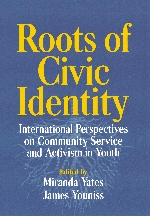Book contents
- Frontmatter
- Contents
- Preface
- List of Contributors
- Introduction: International Perspectives on the Roots of Civic Identity
- 1 Community Service and Political-Moral Discussions among Adolescents: A Study of a Mandatory School-Based Program in the United States
- 2 Social and Family Determinants of Community Service Involvement in Canadian Youth
- 3 Exploring Adolescent Altruism: British Young People's Involvement in Voluntary Work and Campaigning
- 4 Youth, Solidarity, and Civic Commitment in Italy: An Analysis of the Personal and Social Characteristics of Volunteers and Their Organizations
- 5 Political Socialization in the New States of Germany
- 6 Community Service and Social Cognitive Development in German Adolescents
- 7 Adolescents and the “Social Contract”: Developmental Roots of Citizenship in Seven Countries
- 8 Political Socialization in a Divided Society: The Case of Northern Ireland
- 9 Youth Experience in the Palestinian Intifada: A Case Study in Intensity, Complexity, Paradox, and Competence
- 10 Beyond the Call of Duty: The Service of Israeli Youth in Military and Civic Contexts
- 11 Recent Trends in Civic Engagement among Japanese Youth
- 12 Learning Politics in the Crucible: The Socialization of Taiwan High School Students as Citizens in a New Democracy
- Conclusion: Transcending Themes
- Author Index
- Subject Index
Conclusion: Transcending Themes
Published online by Cambridge University Press: 04 August 2010
- Frontmatter
- Contents
- Preface
- List of Contributors
- Introduction: International Perspectives on the Roots of Civic Identity
- 1 Community Service and Political-Moral Discussions among Adolescents: A Study of a Mandatory School-Based Program in the United States
- 2 Social and Family Determinants of Community Service Involvement in Canadian Youth
- 3 Exploring Adolescent Altruism: British Young People's Involvement in Voluntary Work and Campaigning
- 4 Youth, Solidarity, and Civic Commitment in Italy: An Analysis of the Personal and Social Characteristics of Volunteers and Their Organizations
- 5 Political Socialization in the New States of Germany
- 6 Community Service and Social Cognitive Development in German Adolescents
- 7 Adolescents and the “Social Contract”: Developmental Roots of Citizenship in Seven Countries
- 8 Political Socialization in a Divided Society: The Case of Northern Ireland
- 9 Youth Experience in the Palestinian Intifada: A Case Study in Intensity, Complexity, Paradox, and Competence
- 10 Beyond the Call of Duty: The Service of Israeli Youth in Military and Civic Contexts
- 11 Recent Trends in Civic Engagement among Japanese Youth
- 12 Learning Politics in the Crucible: The Socialization of Taiwan High School Students as Citizens in a New Democracy
- Conclusion: Transcending Themes
- Author Index
- Subject Index
Summary
The chapters in this volume offer portraits of youth's participation in community and civic activities in a range of social–historical contexts. The fresh empirical data presented in these chapters indicate that youth's participation in society varies considerably across time and location. In each context, youth are characterized as active decision makers seeking to understand and find their place in the society in which they were born. But youth do not seek simply to fit themselves within the status quo. As several chapters show, youth in many countries play pivotal roles in challenging the existing order and working to improve social conditions.
In this concluding chapter, we identify recurring themes that transcend the varying contexts presented in this volume. Our purpose is to illustrate the emergence of a more adequate approach to political socialization that goes beyond the simplicity of the internalization model and that accounts for human development occurring within social contexts often filled with ambiguous and conflicting perspectives. Our challenge is to understand how youth come to terms with the complexity of society and its political order and also, ideally, come to believe that they can play a role in shaping its future.
The presentation of themes begins with the concern expressed in many countries that contemporary youth are disconnected from political processes and lack a sense of social responsibility. From here, we tie together findings that present adolescents as active participants in figuring out the workings of society and that pertain to the role of social–historical opportunity in this process, particularly as it is instantiated through adolescents’ social relationships with community organizations, family, and friends.
- Type
- Chapter
- Information
- Roots of Civic IdentityInternational Perspectives on Community Service and Activism in Youth, pp. 265 - 274Publisher: Cambridge University PressPrint publication year: 1998



